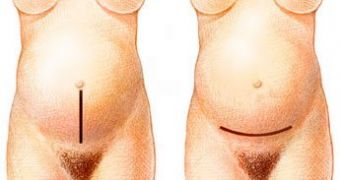This is turning into a birth choice. Cesarean sections keep the "toy" intact and remove many risks and complications. But, here comes the warning signal: it can make babies vulnerable to breathing issues, up to four times more than those born naturally. These are the results of a Danish research at University of Aarhus, carried on 34,000 cases and published in the "British Medical Journal", which guesses this is due to hormonal and physiological changes during labor, involved in the maturing of the lungs.
In western countries, over 25 % of the births occur now through C-sections, while the World Health Organization recommends that this number should not pass over 15 %. About 50 % of them are not emergencies, but elective Cesareans, even if an Oxford University research revealed that women are four times more likely to die in childbirth during a C-section, than during natural birth.
The Danish research took in consideration factors like the mother's age, weight, smoking or drinking during pregnancy. Not only the risk of respiratory issues in the case of elective Cesarean section was higher, but it was growing the earlier the Cesarean was made.
The risk was 4 times higher in the case of a 37 weeks pregnancy, 3 times for 38 weeks, and twice at 39 weeks of pregnancy. For 37 weeks category, 10% of babies born through elective Cesarean section had respiratory issues, compared with 2.8% of those born naturally or through emergency C-section.
The number was 5.1% for 38 weeks elective Cesarean babies, compared to 1.7% of those born naturally or by emergency Cesarean, and 2.1% for those born through elective C-section at 39 weeks, compared to 1.1% for those born naturally or through emergency C-section at 39 weeks. It appears that scheduling elective C-sections until 39 weeks pregnancy significantly decreases the risk of respiratory issues.
"It is plausible that hormonal and physiological changes associated with labor are necessary for lung maturation in neonates and that these changes may not occur in infants delivered by elective Cesarean sections", wrote the researchers.

 14 DAY TRIAL //
14 DAY TRIAL //